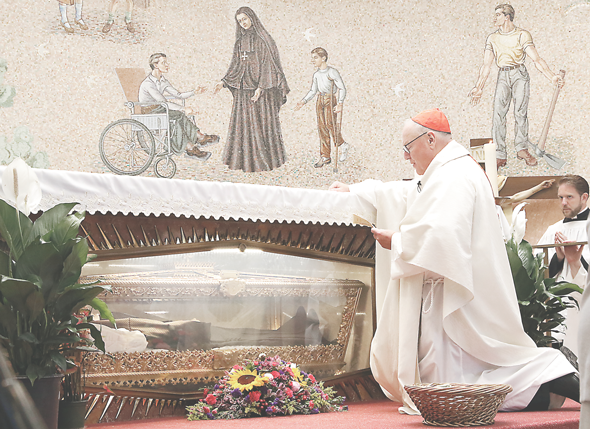
by Msgr. Gregory Mustaciuolo
While there are differences in approaches and solutions, there is broad agreement that more needs to be done to improve health care in our nation. The same is true for this state we call home.
New York has the seventh-highest share of households earning $200,000 or more, but it also has one of the highest shares of households living on less than $10,000. Some 7.4 percent of households in the state live in extreme poverty — well above the 6.5 percent national rate. One in eight households are food insecure — they don’t have enough to eat and they worry about their next meal. Twenty-two percent of New York’s children are growing up poor. That means necessities like food, health care and safety are at risk.
And across the state, individuals with mental illness, drug addiction or criminal records too often don’t have access to the services they need to rehabilitate and lead successful lives in their communities. New York’s rate of opioid-related deaths exceeds the national average and doesn’t discriminate by urban, suburban or rural areas — every region has been devastated by the impacts of this crisis.
The people of New York state deserve equitable access to quality health care and services. So many of the social determinants of health — the conditions in the places where people live, learn, work, and play — affect a wide range of health risks and outcomes well before someone ends up in an examination room. Only by eliminating barriers to care and bridging gaps in health services can we improve the well-being of our most vulnerable communities and bolster their health outcomes.
The health disparities of New York are daunting for anyone looking to make a change. But there is one New Yorker whose example shows exactly where to start.
One hundred thirty years ago, a humble Italian nun was greeted upon her arrival in New York by the news that her accommodations were not ready and her plans to establish an orphanage were in danger of being scrapped. Despite obstacles and opposition, Mother Frances Xavier Cabrini and the nuns who arrived with her were undeterred, forging ahead to serve the poorest among the Italian immigrants in Little Italy. At the time of her death in 1917, Mother Cabrini had founded a total of 67 institutions, including schools, hospitals and orphanages, across the world.
Mother Cabrini was drawn to people and communities who faced the greatest struggles that many New Yorkers still grapple with today: discrimination, marginalization and exploitation. The spirit of service and perseverance she embodied remains a premier example of what we need to close the health gaps in New York state.
The Mother Cabrini Health Foundation is focused on supporting activities and programs that enhance access to affordable quality healthcare and respond to the unmet health care, health care-related, and social determinant needs of individuals, families, and communities across the state.
With up to $150 million in annual grants available, the foundation is now the largest focused solely on New York state. It is our hope that this means we can have an outsized impact and tangibly change the trajectory for all of New York’s underserved populations, including low-income individuals, immigrants, the elderly, pregnant women and new mothers, young people, those with special needs, the formerly incarcerated and veterans.
Whether it is by funding programs to assist with mental and behavioral health, opioid addiction, affordable dental care, or homelessness, we are committed to measurably improving the lives of New Yorkers whether they live in Salamanca, Syracuse, Schenectady or Staten Island.
Our mission is to improve the health and well-being of New York’s poor, disadvantaged and underserved populations. Our model is Mother Cabrini herself, as well as the centuries-long Catholic tradition of healing the sick and caring for the poor. Catholic principles and teachings — especially the rich tradition of social justice — animate and guide the foundation’s work, beginning with an unwavering commitment to the dignity of all people.
We are ready to give New Yorkers most in need better access to health care and an improved quality of life. While none of us on our own can ever live up to Mother Cabrini’s legacy, I can promise that we will be every bit as determined as she was when she first arrived in New York in 1889.
Msgr. Mustaciuolo is the chief executive officer of the Mother Cabrini Health Foundation.
